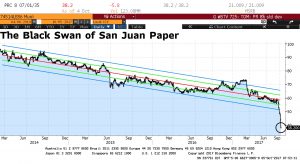Daily Comment (October 5, 2017)
by Bill O’Grady and Thomas Wash
[Posted: 9:30 AM EDT] Financial markets are very quiet again this morning in front of the employment data on Friday. Here is what we are watching:
PM May’s no good, very bad day: With compliments to Judith Viorst,[1] the Tory PM has had a really rough run recently. She was attempting to give a speech that the FT has characterized as a “relaunch,”[2] in which she would discuss Tory plans for energy and housing, when she was struck by a coughing fit and was barely able to deliver her comments. Just before her speech a prankster had delivered a phony pink slip, telling her she had been fired. And, earlier in the week, her foreign secretary, Boris Johnson, undermined May’s positions on Brexit. The Tories are really struggling; recent polling shows that voters under the age of 34 are rapidly abandoning the conservative party. A think tank estimates that the average age of a Tory voter is 72.[3] If the Tories continue to flounder, it just might open up a window for the Corbyn-led Labour Party to gain control of the government. He represents left-wing populism in a nearly pure form. If Labour wins, we would expect the GBP to suffer severe losses. The U.K. currency is weaker this morning due to the political disarray.
Did he say that out loud?! Former Fed Governor Dan Tarullo told the FT something that many of us have speculated about for a while. He admitted the Fed does not have a reliable theory of inflation.[4] For the most part, the FOMC tends to rely on the Phillips Curve, which postulates that there is a relationship between labor slack and inflation. Tight labor markets tend to bring higher inflation and vice versa. Although there is some evidence to support this idea through the 1970s, the relationship is now spotty at best as the economy has become increasingly globalized and deregulated. If Tarullo is right, and we side with his position, the Fed should wait until inflation actually presents itself before acting to raise rates. That isn’t the majority thinking at the Fed, although Governor Brainard, along with Presidents Kashkari and Bullard, would fall into the minority of Phillips Curve heretics.
Saudi King to Moscow: For the first time ever, a Saudi king is visiting Russia. King Salman and President Putin are meeting today, further evidence of a warming relationship. We see two factors driving this growing friendship. First, OPEC’s power has been diminishing because it doesn’t control enough supply to easily adjust prices. In the 1970s, there were periods when OPEC oil was half of consumption. It is now around a third. Getting cooperation from Russia puts it over 45% of supply, meaning supply measures are much more effective. Second, we suspect the Saudis realize the U.S. is gradually withdrawing from the region. Since WWII, the U.S. and Saudi Arabia have had a strong security relationship. This was bolstered by the First Gulf War where the U.S. based Allied troops in the Kingdom to enforce existing borders. However, the Saudis opposed the U.S. invasion of Iraq (the Second Gulf War), fearing it would leave Iraq too weak and fractured to act as a counterweight to Iran. Those fears turned out to be justified. President Obama’s fumbling of the Syrian “red line” added to concerns about U.S. commitment and competency in stabilizing the region. Saudi Arabia appears to be looking at alternatives to the U.S. Russia is far from perfect—it has somewhat close relations with Iran and has, in the past, acted as a free-rider on OPEC supply cuts. But, a visit by a Saudi king to Russia indicates that relationships in the Middle East are becoming fluid.
Puerto Rico bonds continue to slide: Yesterday, we noted that the price of Puerto Rico’s bonds fell sharply after the president’s comments suggesting debt forgiveness for the island commonwealth. That trend continues.

[1] https://www.amazon.com/Alexander-Terrible-Horrible-Classic-Board/dp/1442498161. Most parents have probably read this book to their children at some point.
[2] https://www.ft.com/content/e5cf6b1c-a8d6-11e7-93c5-648314d2c72c?emailId=59d5b9918df16b0004214a71&segmentId=22011ee7-896a-8c4c-22a0-7603348b7f22 (paywall)
[3] https://www.ft.com/content/b97e04d8-a854-11e7-ab55-27219df83c97 (paywall)
[4] https://www.ft.com/content/a5438cce-a933-11e7-ab55-27219df83c97?segmentId=a7371401-027d-d8bf-8a7f-2a746e767d56 (paywall)


